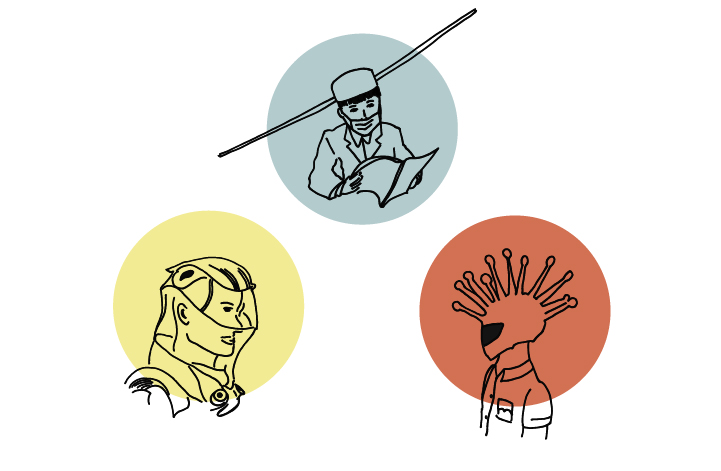
Bacteria Masks | Sum Studio
Beyond the variety of sewn, 3D-printed and other DIY masks produced over the course of the pandemic, bacterial cellulose became an innovative yet overlooked material for masks as well. Not only in response to shortages of industrially produced masks, they reflected an ecological no-waste approach that illustrated how scientific advances could be implemented in a low-tech way.
The air-filtering capacities of bacterial cellulose, initially intended to filter drinking water, proved to be a biodegradable alternative to surgical masks. Lab- or home-grown, they could be made via decentralised production systems and employed bacteria as non-human workers. An early version of these masks in response to the Covid pandemic was proposed in spring 2020 by New York based designers Elizabeth Bridges and Garrett Benisch of Sum Studio. A → Chinese patent for a similar concept had already been filed by Chunyan Zhong in 2009 and approved in 2011, which runs counter to the DIY spirit proposed by the New York designers.
Their production partners were the bacteria Xylinum acetobacter who produced the cellulose while immersed in a solution of water, tea and sugar. After several weeks, a thin layer of cellulose floats at the top. Leather-like, it can be easily cut and sewn. The designers claim a filtering efficiency similar to N95 masks and its translucent appearance could be an advantage in a variety of settings where masks become mandatory. They allow visibility of facial expressions and could be reassuring to those struggling to recognise masked faces.
With its longer, slower production process requiring little human intervention, production of the bacteria mask could be seen as a ritual reflecting the interruption of industrial productivity and renewed focus on nature during the pandemic. Idealistically, the proposal seeks to radically reimagine the way we approach emergencies.
(see also: Liberal Reformer Design | Tony Fry)
(See also: → Liberal Reformer Design | Tony Fry)
Keywords:
DIY, Ritual, Hygiene, Decentralised Production
Further reading:
→ Burhani, Dian. “Bacterial cellulose provides hope for eco-friendly medical mask”, The Jakarta Post, 14 December 2020
→ “Sum Studio's home-grown cellulose mask promotes the benefits of biodesign”, Designboom, 13 May 2020
→ “Xylinum Mask”, Sum Studio